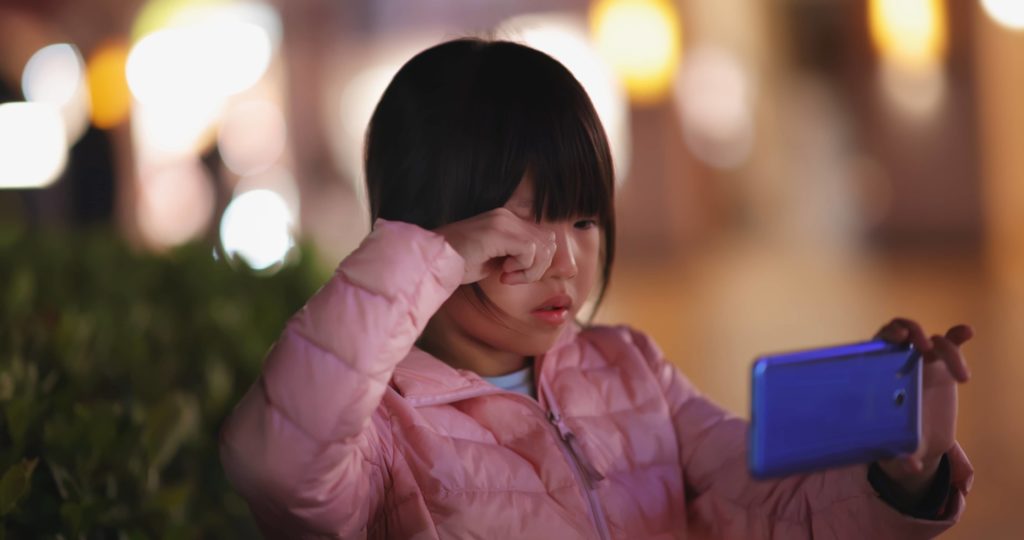Blinded by Facts: Challenges faced by an Increase in Screen Time
28 Mar 2021 | Anne Marie Fogarty
| Share with

As the wrath of Covid-19 swept the world, millions of people and governments were forced into lockdown, displaced, and confined to their own houses. In these unprecedented times, the “digital space” played a tremendous role by proving to be an absolute “blessing in disguise” for many of us, but it came with its consequences.
Are children using digital space too much?
Children were more susceptible to the digital space’s negative impact during this lockdown out of the general population. As social interactions reduced, children worldwide decided to hang on to their screens to make up for the lack of social interactions in-person. Hours of binge-watching, an Increase in social media activity, and online E-learning have made ophthalmologists raise concerns about “eye-care” and “vision impairment.”
Read more here about the effects of the pandemic on children.
According to a UNICEF report, one in three active consumers of the Internet is a child under the age of 18. While the Internet has many benefits for our children, it can pose a significant threat to their eye’s health if managed foolishly.
Dry eyes and difficulty focusing, eye fatigue, and irritation occur because when you read from a screen, your blink rate plummets. And so, your eyes are not being lubricated as they should, so they become dry, tired, and irritated. Along with these conditions, excessive and up-close visual stresses, such as computer use, is also a known risk factor for Myopia (nearsightedness)- a condition that could well be the next global pandemic.
What is Untreated Myopia?
Myopia is an eye disorder that makes distant objects look blurry and near objects clearer. Commonly also known as “nearsightedness,” the causes of Myopia are due to genetics, lifestyle changes, environmental factors, but an increase in screen time constitutes a chunk of the reasons in recent cases. If Myopia is not checked or goes untreated, your vision and quality of vision will deteriorate gradually.
Apart from the risk of getting contracted by an eye disease, the repercussions of an increase in screen time activity affect other dynamics of our lives.
Children have reported showing signs of
- Difficulty with learning
- Difficulty in reading
- Inability to concentrate for long hours
- Headache
- Fatigue
- Irregular Sleep-Cycle
What do children use screens for?
The content children usually consume on digital platforms is the pulling force to your child’s attention. Usually, children dedicate their screen time to establish communication in the global community through social media. Other than that, listening to music, playing games, browsing the Internet, and learning or participating in any recreational activity.
Screens have positive impacts on the child’s mind and can prove very informative and educational, however, we can not be blind to the negative outlook excessive screen use has on vision and mental health.
The paramount issue of reducing screen time needs to be fixed to save a generation of children from having vision problems. Parents and Teachers must be willing advocates in helping their children reduce screen time and give alternatives for holistic growth and development.
What can we do to help reduce screen time for our children?
Here are some of the ways you could incorporate and help your child:
- “Digital Discipline” is the ultimate key to help curb your children or students from using laptops or mobiles excessively. Limiting and giving them a specific time to use electronic devices will help them not get addicted to the platform.
- Encouraging and introducing them to outdoor sports or wonders of nature will help them cultivate their minds.
- Do not give in to tantrums or petty behaviour by giving them their device to keep them distracted.
- Reading will help them lose their minds in the world of fiction and reality rather than digital fantasies.
- For instance, set healthy digital boundaries while switching off your gadgets while studying, keeping your mobile phone away before going to bed.
- Spread awareness about digital detox.
- Be a good role model – there is no point in you telling your children to get off technology at the dinner table as you scroll through your own social platforms.
Positive screening is an actual thing if you make it happen!
In conclusion, making safe digital choices and using them in moderation will not just positively impact your physiological health but also contribute in abundance to your mental health.
Leave a Comment
You must be logged in to post a comment.

28 Mar 2021 | Leave a comment
Share with socials